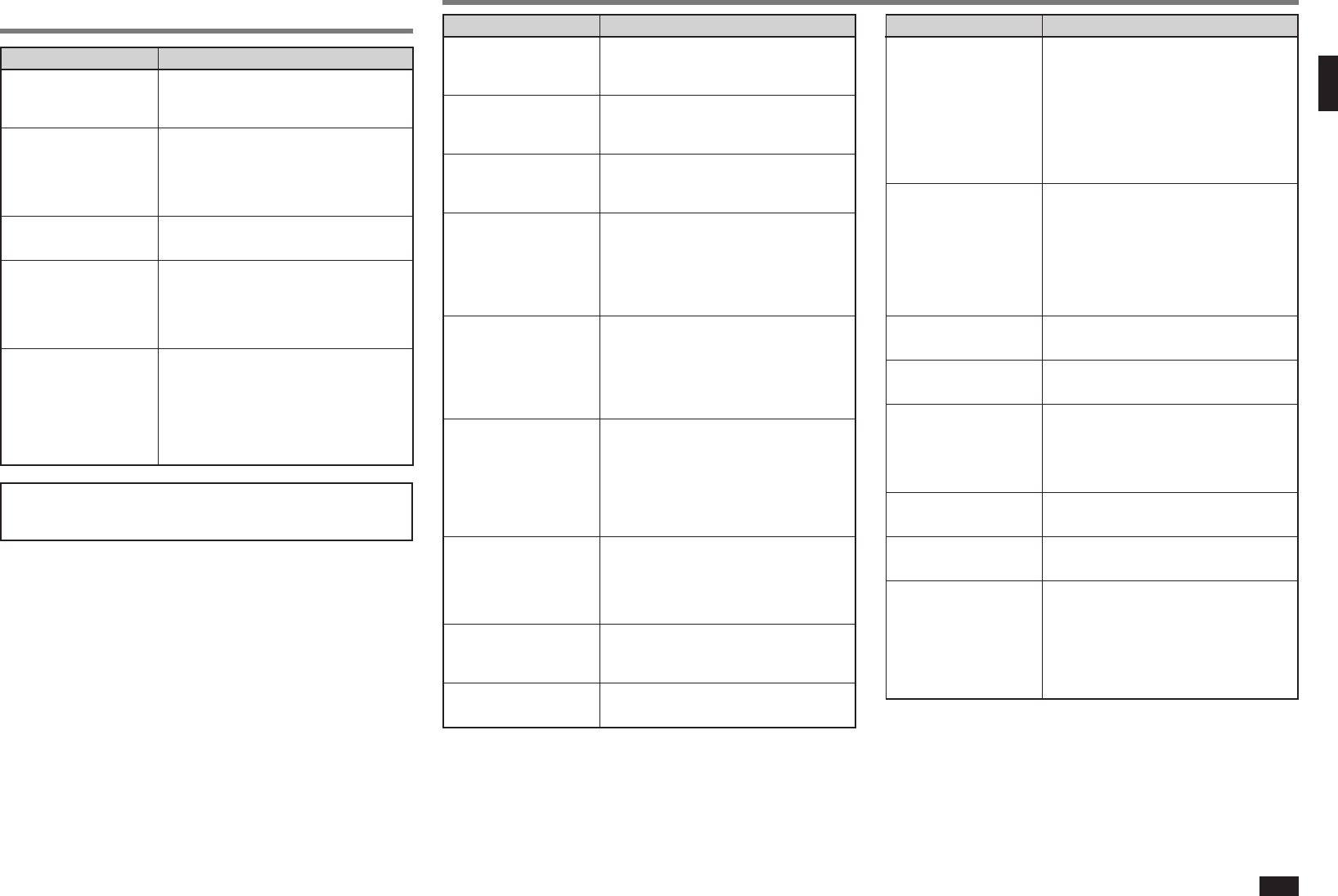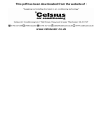
11
BEFORE CONTACTING THE SERVICE REPRE-
SENTATIVE, CHECK THE FOLLOWING AGAIN
Question
The air conditioner cannot
be operated for about 3 min-
utes when restarted.
Cracking sound is heard.
The air from the indoor unit
smells strange.
The fan of the outdoor unit
does not rotate even though
the compressor is running.
Even if the fan starts to ro-
tate, it stops soon.
The sound of water flowing
is heard.
The sound as burbling is
heard.
The room cannot be cooled
sufficiently.
Mist is discharged from the
air outlet of the indoor unit.
Mechanical sound is heard
from the indoor unit.
Answer (not a malfunction)
• This protects the air conditioner according to in-
structions from the microprocessor. Please wait.
• This sound is generated by the expansion/con-
traction of the front panel, etc. due to change in
temperature.
• The air conditioner may suck in an odor adher-
ing to the wall, carpet, furniture, cloth, etc. and
blow it out with the air.
• When the outside temperature is low, the fan
may not operate to maintain sufficient cooling
capacity.
• This is the sound of refrigerant flowing inside
the air conditioner.
• This is the sound of condensed water flowing in
the heat exchanger.
• This is the sound of the heat exchanger defrost-
ing.
• This sound is heard when the outside air is ab-
sorbed from the drain hose in turning on the
range hood or the ventilation fan and that makes
water flowing in the drain hose spout out.
This sound is also heard when the outside air
blows into the drain hose in case the outside wind
is strong.
• When a ventilation fan or a gas cooker is used
in a room, the cooling load increases, resulting
in an insufficient cooling effect.
• When the outside temperature is high, the cool-
ing effect may not be sufficient.
• The cool air from the air conditioner rapidly cools
moisture in the air inside the room, and it turns
into mist.
• This is the switching sound in turning on/off the
fan or the compressor.
WHEN YOU THINK THAT TROUBLE HAS OCCURRED
Question
The air conditioner cannot
be operated.
The room cannot be cooled
or heated sufficiently.
The air from the indoor unit
smells strange.
The display on the remote
controller does not appear
or it is dim. The indoor unit
does not respond to the re-
mote control signal.
When a power failure oc-
curs.
Check points
• Is the breaker turned on?
• Is the fuse blown?
• Is the ON timer set? (Page 9)
• Is the temperature setting correct? (Page 7)
• Is the filter clean? (Page 10)
• Are there any obstacles blocking the air inlet or
outlet of the indoor or outdoor unit?
• Is a window or door open?
• Is the filter clean? (Page 10)
• Are the batteries exhausted? (Page 5)
• Is the polarity (+, -) of the batteries correct?
(Page 5)
• Are any buttons on the remote controller of other
electric appliances being pressed?
• Does the air conditioner start operating again?
If the air conditioner had operated before the
power failure, as these models are equipped with
an auto restart function, the air conditioner
should start operating again. (Refer to Descrip-
tion of “AUTO RESTART FUNCTION” on page
6.)
Question
The air flow direction
changes during operation.
The direction of the hori-
zontal vane cannot be ad-
justed with the remote con-
troller.
Water leaks from the out-
door unit.
White smoke is discharged
from the outdoor unit.
Air does not blow out soon
in the heating operation.
The operation is stopped
for about 10 minutes in the
heating operation.
Hissing sound is some-
times heard.
The room cannot be heated
sufficiently.
The air conditioner starts
the operation only with the
main power turned on,
though you do not operate
the unit with the remote
controller.
Answer (not a malfunction)
• When the air conditioner is operated in COOL
or DRY mode, if the operation continues with air
blowing down for 1 hour, the direction of the air
flow is automatically set to position 1 to prevent
condensed water from dropping.
• In the heating operation, if the air flow tempera-
ture is too low or when defrosting is being done,
the horizontal vane position is automatically set
to position 1.
• During COOL and DRY operations, pipe or pipe
connecting sections are cooled and this causes
water to condense.
• In the heating operation, the defrosting opera-
tion makes water frozen on the outdoor unit melt
and drip down.
• In the heating operation, water condensed on
the heat exchanger drips down.
• In the heating operation, vapor generated by the
defrosting operation looks like white smoke.
• Please wait as the air conditioner is preparing
to blow out warm air.
• Defrosting of the outdoor unit is being done (De-
frosting operation).
Since this is completed in 10 minutes, please
wait. (When the external temperature is too low
and humidity is too high, frost is formed.)
• This is the sound when the flow of refrigerant
inside the air conditioner is switched.
• When the outside temperature is low, the heat-
ing effect may not be sufficient.
• These models are equipped with an auto restart
function. When the main power is turned off with-
out stopping the air conditioner with the remote
controller and is turned on again, the air condi-
tioner will start operation automatically in the
same mode as the one set with the remote con-
troller just before the shutoff of the main power.
Even if the above items are checked, when the air conditioner does not
recover from the trouble, stop using the air conditioner and consult your
dealer.
In the following cases, stop using the air conditioner and consult your dealer.
• When water leaks or drops from the indoor unit.
• When the left operation indicator lamp blinks.
• When the breaker trips frequently.
• The remote control signal may not be received in a room where an electronic
ON/OFF type fluorescent lamp (inverter-type fluorescent lamp, etc.) is used.
• Operation of the air conditioner may interfere with radio or TV reception in
areas where the reception is weak. An amplifier may be required for the af-
fected device.
• When thunder is heard, stop operation and disconnect the power supply plug
and/or turn off the breaker. Otherwise, the electrical parts may be damaged.















